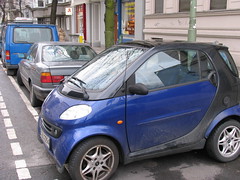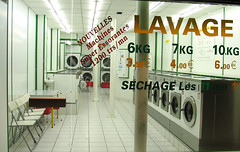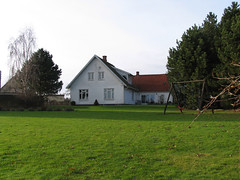Tuesday, December 20, 2005
Complexity theory as a basic litteracy
The Danish school system is built on 5 basic ”litteracies” – the fundamental skills you need in order to keep learning and to function in a modern society. The 5 litteracies are: reading, writing, math, being able to use information technology and English as a second language.
Obviously, what skills should be considered basic litteracies changes as society develops. So is there some new skill that will be indespensable in the future? Well, yes.
As everybody and everything are increasingly becoming connected in global, ubiquitous, high-density, always on networks we need to understand how complex dynamic systems work. You know: the internet, the market place, ecology, politics… complex systems are everywhere.
There’s a “package” of mechanisms that are common to all aspects of complex systems. They are all inter-connected and I don’t quite know what the overall title to the package should be. But among the contents are:
- - Feedback, non-linearity
- - The emergence of natural patterns such as fractals and hexagons
- - The same patterns occuring on all scales – from atomic to galactic
- - Evolution, genetics
- - Complex behaviours emerge in the interaction between many very simple functions
- - Small changes in initial conditions can have great consequences
- - Diversity makes a system more robust
- - You are dealing with probability rather than certainty
These are crucial insights – and I believe they will become even more so in the future. In many ways they run completely counter to the linear, top-down, predictable logic that formed the basis of industrial society.
I would argue that an understanding of this package of mechanisms will be a basic litteracy – if it isn’t already. But it’s not taught in a systematic way today. It doesn’t fit into one particular subject, and the concepts seem too abstract to communicate to children.
In fact I think there are lots of ways to teach and learn about complexity that are tangible, grounded in everyday life, and intuitively easy. One example that doesn’t quite get there is LEGO Mindstorms. I sense that it can be made easier still – hopefully, we can demonstrate that within a couple of years.
Learning - forget about subjects
Here's one observation from there:
In a traditional school subjects are kept separate. The schedule shows it clearly: math, language, biology, history, physics etc. But this kind of compartmentalization is probably somewhat counter productive.
In many cases it would make more sense organizing learning around a different structure.
An example would be to use a narrative as a starting point, weaving aspects of many different subjects into the project.
Starting with the narrative makes it much easier to engage the learner through the usual narrative elements that drive a story forward. It also makes it easier to show how things are connected, and how what you learn can be applied in some situation.
If you have kids you have probably observed how engaged they become when the regular schedule is abandoned for a week or so to work on a particular theme or project.
Cross disciplinary projects, with elements of a narrative, connecting to everyday experiences and observations, demanding the learner to explore, structure, build and present – it makes sense not just for pedagogical purposes, but also because it is a reflection of what reality is actually like. These are the skills we will need – rather than merely reproducing what you are being told in a one-way transfer of facts from teacher to student.
Friday, December 09, 2005
Details with a difference

Several people (no, not from Denmark) have told me how the integration of an ipod with the stereo system was a major factor when they choose their new, expensive car. Amazing how a $250 gadget can determine the purchase of product that's a hundred time more expensive.
The trendwatching site Übercool has collected some good examples of how some car manufacturers have started to adress this in this article.
Big Brilliant Weirdness

More video: The Carlton draught ad which is running in Australia is soo meta. Good fun, big budget. Big ad!
Wednesday, November 23, 2005
Bad taste - but funny, somehow
This fake advertising for Volkswagen Polo is utterly distasteful, I know.
Sunday, November 20, 2005
Friday, November 18, 2005
The place to sleep in Copenhagen
I have previously blogged about how much I like staying at hotel Guldsmeden in Århus. They have a hotel in Copenhagen as well and I can now report that it is just as great. Good atmosphere, nice furniture, free wifi, best breakfeast I can remember offhand. Reasonable prices too.
Appearantly the Guldsmeden folks are going upscale next. They are renovating another Copenhagen hotel, it will be a 4 star joint, with a cafe. If I get the chance to stay there, I shall report.
Olafur Eliassons "Light Setup"

If you are anywhere near the Swedish cities Malmø or Lund I can recommend taking a look at Olafur Eliassons twin exhibitions at the municipal art spaces of those two cities. The title is ”the light setup”.

The show in Lund is a collection of around hundred works, more or less finished, each an experiment testing some idea, an effect, a shape, an optical illusion. At first it looks it looks pretty messy, like a peek into someone’s workshop, but once you get into it, great depths of beauty reveal themselves.

The way I see it, Eliasson doesn’t really create art himself. Rather, he creates mechanisms and spaces where we can stop and discover the art and beauty in natures’ shapes and functions. Waves, spiral, shadows, fractals. Very stimulating.
The other show is very different. All of Malmø kunsthal is just one great space. At one end the whole is turned into a bright, uniform light, with the warmth of the color oscillating slightly from yellowish to more blue. Part of the ceiling is also a big sheet of light. Simple, beautiful. Go see!
Open til january 8th.

Tuesday, November 08, 2005
Clashing paradigms - work in progress
I'd be happy to hear any comments or additions.
Sorry about the layout, I can't figure out how to fix it. Just keep scrolling down, it will come.
| industrial society | information society |
| Hierarchical | networked |
| top down | bottom up |
| client - server | p2p |
| zero sum | plus sum |
| screw 'em | explicit interdependence |
| exclusivity | sharing, open source |
| distinct roles, producer - consumer | blurring roles, co-creation |
| Monopolization of means of production | Distribution of the means of production |
| high entry barrier to production | low entry barrier |
| Broadcast | many to many |
| centralisation | decentralisation |
| Authority | wisdom of the crowd |
| Follow orders | creative thinking |
| motivation; money, orders | motivation: fun, recognition |
| control | anarchy (as Kropotkin defined it) |
| vision, direction, intent | emergent solution |
| Radically different innovation | incremental innovation |
| Longterm planning | Ad hoc |
| mechanical paradigm | biological |
| exact | fuzzy |
| hard science, predictable | soft science, probabilistic |
| reductionist | holistic, emergence |
Flying in the face of reason
In the news, this was presented as something like a christmas gift to us all; Ah, now we can go fly as we please, unburdened by crunching taxation.
But this is 2005, we’re in the age of rampant global climate change and the end of fossil fuel is near. If anything, I would have expected an attempt to finally put some taxes on jet fuel which at the moment is totally exempt.
We’ve got a fundamental clash of logics happening here:
The prevailing logic: Gotta move faster. Of course, cause everybody else does, too. I understand, I really do.
The logic of reality as I see it to the best of my knowledge:
Air traffic is the fastest growing segment in transportation. Travelling a mile in a plane uses about the same amount of fuel pr. Person as in with cars – but you rarely just get in and fly 1000 km. or more for a meeting or a weekend. Plus, the fumes are released in a more fragile part of the atmosphere making their contribution to the greenhouse effect much worse. Compared to car travel, air traffic is way cheaper because there are no taxes on the fuel.
Meanwhile, DSB – the national Danish railways – are losing thousands of passengers due to perpetual, yet un-predictable major delays because the trains can no longer drive at high speeds on rails that are poorly maintained.
Saturday, November 05, 2005
Good reasons not to act
We ought to change our lifestyle and our consumption – but we don’t. To the contrary, it’s an age of expansion, for many of us way beyond what we were able to imagine just recently.
There are good reasons NOT to hold back on consumption. Maybe the most important one is that consumption of ressources is directly related to power. The more energy you use, the more power you have – more or less. If you jet around, if you jump in the car and speed ahead, if you don’t slow down to pick up the garbage, you will have more power. You can get things done, you are a player in a very different way than somebody ”sitting self- righteously at home in a woolen sweater”, as British journalist Mark Lynas puts it.
Changing the world by setting a good example of low consumption and responsible behaviour sounds like the right path, but it’s just not very sexy.
And maybe, maybe it’s simply not the best solution.
Who knows? Maybe the best we can do is to keep jetting around, accellerating life and the economy in the hope that this will quicken the development of some wonderful technical fix that will once again buy us time in the land of mindless, convenient consumption.
It’s weird, though, there’s so much we ought to do, so many solutions that we pretty know would help somewhat, but ironically we’re simply too busy to do anything serious about it.
Engaging ourselves in changing the world will be a very sophisticated sell – or it will be prompted by un-ignorable necessity.
Saturday, October 29, 2005
I wish there was some good news

Photos by Mark Lynas, www.marklynas.org

At the Poptech conference last week British journalist Mark Lynas gave one of those presentations that leave you rather depressed.
Global warming is certainly happening, and I keep hoping someone would come up with a bit of good news, like, they've found out that it's not so bad after all. But every time I listen it seems to be getting worse.
Mark Lynas has travelled the globe, documenting the already visible effects of the changing climate. Among other places he went to the Peruvian Andes where his father had worked as a geologist in the 1980ies. He had his dads' old photos from the glaciers there and took new photos in the exact same spots. The upper photo is from 1980, the lower from 2004. Uhh!
A big beautiful whale blowing


Wonderful, I went to Iceland on business. In the science-park we have an artificial Geysir that erupts 18 meters into the air.
I figured it might be fun to have a live webcam showing the REAL geysir next to ours, as part of our attempts to explain visitors how a geysir works.
So on my way back from Boston I made a stopover and had a great day with my counterpart at the Geysir. Oh Iceland, it’s incredibly beatiful.
The shots here show part of what’s going on; hot and cold meeting in the 40 meter deep hole, pressure building up till suddenly... BOOM!
Then the boiling waters flows back into the hole with a deep sucking sound. You clearly get the sense that the earth is a big, living creature. Rumbling and pumping like a heart beating, drawing air, exhaling, steaming and sweating. Maybe we’re standing on top of a big whale.
Maybe it’s whales all the way down...
Friday, October 28, 2005
Fremtids arkæologi
Sorry, this is just for the Danish speaking:
Jeg har det sidste halve år haft en artikel serie i Samvirke med titlen "fremtids-arkæologi".
Jeg har lagt 6 artikler på mit website, den 7. følger om en måneds tid.
The hands from the trains of Bombay
Lots of it seems very depressing, but he offers this beautiful image of why he, despite all the problems, believes that Bombay is a city of the future and how the people living there show a way forward:
”If you are late for work in the morning in Bombay, and you reach the station just as the train is leaving the platform, you can run up to the packed compartments and find many hands stretching out to grab you on board, unfolding outward from the train like petals. As you run alongside the train, you will be picked up and some tiny space will be made for your feet on the edge of the open doorway. The rest is up to you. You will probably have to hang on the door frame with your fingertips, being careful not to lean out too far lest you get decapitated by a pole placed too close to the tracks. But consider what has happened. Your fellow passengers, already packed tighter than cattle are legally allowed to be, their shirts already dreanched in sweat in the badly ventilated compartment , having stood like this for hours, retain an empathy for you, know that you boss might yell at you or cut your pay if you miss this train, and will make space where non exists, to take on more person with them. And at the moment of contact, they do not know if the hand that is reaching for theirs belongs to a Hindu or Muslim or Christian or Brahmin or untouchable or whether you were born in this city or arrived only this morning or whether you live in Malabar Hill or New York or Jogeshwari (...). All they know is that you’re trying to get to the city of gold, and that’s enough. Come on board, they say. We’ll adjust.”
Big box mart - crap ain't free

JibJab have produced another masterpiece. Among many other funny and deep videos they produced the hillarious ”this land” parody about Bush and Kerry using Woody Guthries old song.
Now take a look at the ”Big box mart”- video.
Uhh, very funny, very frightening. Are the chinese taking over – or are we driving ourselves into the ground?
Saturday, October 22, 2005
Marxism and open source
Though he didn’t point it out directly, Yochai Benkler’s talk yesterday at Poptech got me thinking about how the open source paradigm relates to the good old marxist analysis of the power of controlling the means of production.
Marx showed how capitalism tends towards ever larger players as each company has to invest in ever more advanced and more expensive machinery in order to compete.
To finance this increasing investment the companies need to expand their market and this gradually presses out the smaller players who lose out in the escalation of investments.
So, in this way capitalise leads to fewer producers, more expensive means of production and a very clear distinction between those that have the means to produce and the masses that consume.
We see this in places like the production of micro processors, cars, or LCD screens. There’s only room for a handfull of players in these industries – you cannot make chips as a cottage industry.
But then a completely different kind of technology comes along. With PC and networks, suddenly the means of production are in-expensive, they’re in the hands of millions, they are suited for networking, co-laboration.
So the lines between producer and consumer blurrs, and it spreads as more industries see a rising part of what they produce becoming information, digital content.
Obviously, the next step will be when actual physical manufacturing gets into the hands of the masses as 3D printing makes it way into everyday reality.
We’re in the middle of a clash of economic paradigms. In fact the clash extends much further – but that’s a very long story.
From broadcast to conversation/ co-creation

Very interesting new browser coming up, from some of the folks that were involved in firefox. It’s called Flock.
What it seems to do is take another major step towards turning the web into a massively multiplayer conversation.
It makes blogging extremely fast and easy in so far as it speeds up quoting and referring to stuff on other websites. You simply cut and paste what you want to show in your blog. It even automatically insert a link to the original source.
And it has a window for adding tags right at hand.
In fact tagging or marking places of interest and sharing your preferences with others is completely integral to the way you use it – as is RSS feed reading.
For me the significance is the way it from the start treats the web as a place for conversation and remixing. We’re really leaving broadcasting with flock.
Friday, October 21, 2005
The time line is on line

My latest project is a timeline on Danfoss Universe' webpage.
The timeline runs from the year 1700 and by navigating back and forth and clicking on milestones you can learn about the major technological inventions, historical events in world history and in Denmark – and of course, milestones for the Danfoss company. The timeline is launched as part of the celebration of the 100th birthday of Mads Clausen, the founder of the comapany.
It’s been a major effort coordinating a lot of very good people writing, coding, translating, gathering pictures – and IMHO it’s turned quite nice.
For me, the project has yielded a few interesting historical insights: We may feel that we are living in a time when technological development is at ist fastest and most radical ever. But take a look at the fifty years from 1875 to 1925. Among the inventions of that period are:
Telephone
gramophone
moving pictures
Light bulb
battery
AC motor
car
solar cells
time zones
bicycle
x-ray photography
radio
coca cola
airplane
plastic
Relativity theor y
...How’s that for technological change?
MIT press bookstore - ah, the temptations
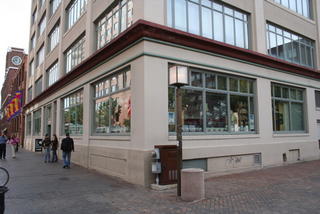
Of all the wonderful bookstores on earth the MIT press bookstore at Kendall square in Cambridge is probably the one I like the best.
Small, compact, packed with way too much interesting information – so much I’d love to know. I can easily spend an hour browsing – and even swing by again the next day.
What I got:
Felice Frankel; Envisioning science
O’reilly’s magazine Make
Vital signs 2005 from Worldwatch institute
Sean Carroll; Endless forms most beautiful – the new science of evo devo
John Thackara: In the bubble
There was much more, I could have gotten. It takes tough discipline and prioritizing. I have to carry it home, and I have to read it. And who knows what other great books I may stumble upon in the coming days?
Tuesday, September 20, 2005
Self expression - or survival
Recently at Danfoss universe we had professor Neil Gershenfeld from MIT's Center for Bits and Atoms visit us and talk about his "fablab" concept.
His observation was that in developed countries, the fablabs would be used by people who created stuff they need: spare parts, some sort of sensor, a better machine for their work - practical things for daily survival.
At the fablab in Boston and at his classes at MIT, the lab would be used for self expression; art projects, weird non-rational ideas.
To me, the important part is that it's all very creative and no matter if you are creating to survive or creating to fight boredom, you need to get some basic understanding of the tools and the principles of constructing things in order to make an idea physical.
But it underlines the differences in how we approach technology in different parts of the world.
Big green
In a way I would love to think that they are serious about their commitment, I really hope that they have realized that they can play a decisive role in changing the course away from destruction. But then again, it's hard not to be a bit cynical about corporate greeenwash.
There are some weird, but no doubt carefully calculated, touches to their website. It shows CEO Immelt and others talking to us, set in an abstract landscape held in earthly green and brown colors. There are trees, birds, water - and then an airplane crosses the sky in the background. I guess it's meant to show that planes are as natural as birds.
Another part of the flash animation shows a big cruise ship making it's way in the background. GE assures us: planes and cruise ships will not go away, even if we try to save the planet.
GE presents some amazing statistics and predictions, quoting the UN:
Registered autos in 1990: 560 mio.
- in 2010: 940 mio.
Oil consumption in 1990: 24 bio. barrels
- in 2010: 38 bio. barrels
Soft drink consumption in 1990: 364 mio. barrels
- in 2010: 765 mio. barrels
Municipal waste in 1990: 420 mio. tons
- in 2010: 860 mio. tons
Monday, September 19, 2005
So you think you can tell
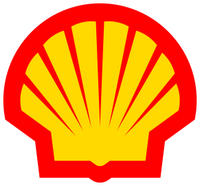 An amazing quote from Shell's scenario planning division in their 2001 scenarios "energy need, choices and possibilites 2050":
An amazing quote from Shell's scenario planning division in their 2001 scenarios "energy need, choices and possibilites 2050":”Technology improvements are likely to outpace rising depletion costs for at least the next decade, keeping new supplies below $20 per barrel.
The costs of biofuels and gas to liquids should both fall well below $20 per barrel of oil equivalent over the next two decades, constraining oil prices”.
...This is the worlds' largest oil company and its very well qualified scenario division speaking.
Wednesday, September 14, 2005
Wrecking the world for trinkets

There’s a certain genre of products that I vigorously hate. The stuff you buy in gift shops, or in the kind of surplus stores where every item in the store costs a euro or two. Cheap toys, cheap tools, decorations, colorful blinking gadgets.
At every birthday you end up with a heap of these items. Trinkets, little curiosities, jokes. A pen radio, a weird looking plastic sculpture, a set of screw drivers...
My problem with it is that in one sense these things are not cheap at all. There’s a price. You get a clear sense that behind each of them, there’s some horror story of dreadful working conditions, toxic materials, and poor people slaving at miserable salaries.
How else can you make money on transporting an item all the way here – where somebody still is able to make money on it, though it only costs a couple of euros.
Another reason I get upset is this whole idea of producing stuff so cheaply that it doesn’t really ever work. Tools that are so imprecise and cast from soft iron so soft you can’t do anything with them. Toys that only work for a few minutes, ”funny” figures of plastic that are fun for a moment – and then gather dust. What are we teaching our kids by giving them this crap?
Items made of finite or toxic materials, wrapped in even more materials, shipped across the globe, giftwrapped – all this, just to proceed straight to the junkheap.
I get the feeling that we are wrecking the world for trinkets.
Outlook - the game

On several occasions lately, I’ve been trying to explain why MMOGs (yes, Massively Multiplayer Online Games) are interesting to study as an indicator of how we will cooperate, socialize, trade, create and seek information in the years ahead.
The hard part part is the ”game” word. Games, and computer games in particular, carry a lot of stigma. Many see it as exactly the opposite of the kind of interaction and participation they would like to see.
It seems to help if you describe the ubiquitous Microsoft Outlook as an MMOG. We don’t think of it as playing a game, but we do spend hours in that environment, dealing with lots of players, some of whom we build up quite close relationships to online. Like an MMOG, Outlook is something you build up, it’s persistent and dynamic, even if you’re not yourself online. There’s considerable creative possibilities, you can trade, exchange information or products, you can co-create, you can have pranks and challenges.
But of course, there’s not much in terms of graphics, no avatars, no soundtrack – yet...
Saturday, September 10, 2005
Jetplanes and guilt
My good friend Adam has heard my scruples about flying for years. He pointed me to this article from OnEarth Magazine which tells about a number of organisations that will plant trees for you to offset the effects of your flying.
For instance, a round trip from San Francisco to Shanghai will produce 2.2 tons of carbondioxid emissions. This can (in some more or less abstract sense) be offset by planting three trees or changing three ordinary light bulbs to energy saving ones. Depending on what organisation you choose, for around $20-40 you can have them plant the trees or install lightbulbs.
Among the organisations are American Forests, which have an online Climate calculator that will give you a sobering view at the side effects of transportation.
Tuesday, September 06, 2005
What's the right question?
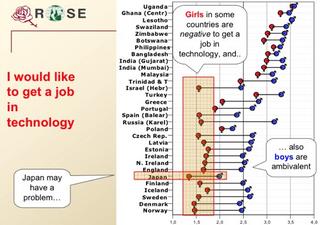
There’s plenty of concern about the lack of interest and knowledge about technology and natural science among children and students. However, it’s a little hard for me to see exactly where the problem lies. For instance, The ROSE study, which has asked a huge number of children all over the world about their interests in science, clearly shows that children in the richest countries have the least interest and respect for science.
A particularly telling statistic is this figure, which I have taken from a presentation by Norwegian professor Svein Sjöberg who leads the Rose study.
Kids were asked if they would like to get a job in technology. This is very appealing to kids in countries like Lesotho, Uganda or Zimbabwe, whereas kids are increasingly negative the richer the country the come from is. The least interested in a technology job are Japanese boys.
Other questions in the study show pretty much the same attitude to science and technology.
Now, does this mean that Japanese boys don’t care about technology? I doubt it. It’s hard to think of anyone who are more inundated by technology than japanese boys. They live in a world that is nothing but technology, and mastering technology determines how well they can participate socially in society.
Technology in Osaka is not the same as in Kampala. The japanese boy may not be interested in basic technology, because it is not relevant and immediately necessary for him to know about it in the same way that it is for someone in Uganda.
You miss something very important if you don’t realize that the japanese boy is very likely to have an expert knowledge in technologies like sharing files, surfing and downloading, choosing the right shoe for athletics or the set of headphones with just the right sound. But it could very well be that this is not ”technology” to him – it’s just the way the world works.
Maybe we need to ask the question in a different way in order to understand what relation students have to science. I bet it would turn out to be a lot more sophisticated than current studies show.
Wednesday, June 22, 2005
No, you're too fat to drive
Her solution: a moped, or Segway of sorts, that would measure your body fat index and refuse to drive if you were getting too heavy.
I could see some interesting scenes with people trying to argue with their Segway or hacking it to give ’em a ride.
Gentlemen, start you engines
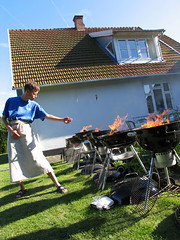
5xgrill
Originally uploaded by Peter Hesseldahl.
It's time to get out the grill before winter strikes again.
A public private sphere
The latest version of Apples Safari browser (2.0) has a feature called ”private browsing”. This is how Apple describes it:
”When private browsing is turned on, webpages are not added to the history, items are automatically removed from the Downloads window, information isn't saved for AutoFill (including names and passwords), and searches are not added to the pop-up menu in the Google search box”.
I like that, It really annoyed me that I couldn’t control what information I revealed about myself to anyone who I might be collaborating over the screen with.
But in fact, it’s more or less just returning to how things used to be. It would seem smarter if you could opt for an in-between solution. Keeping the data, but only showing them if you specifically need to. History data can be very usefull – and very revealing.
One more thing, sort of on the same subject: I hate it when powerpoint presentations end, or when you have to skip from one presentation to the next, and the whole crowd gets exposed to the desktop clutter. It’s like seeing people in their underwear, it can be interesting, a voyeuristic thrill, but basically it damages concentration on the topic you were supposed to focus on.
Thursday, June 09, 2005
Phone booth without a phone
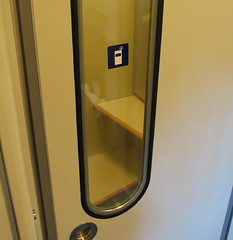
finnish_phone_booth_crop_500
Originally uploaded by Peter Hesseldahl.
Nice touch. Where else but in Finland would you find a phone booth in trains without a phone? Or rather: In Finland, why would you want a phone in a booth for phoning - everyone has a phone in their pocket already.
Somehow significant; the way technology changes the architecture of the space we inhabit.
Friday, June 03, 2005
Bad energy forecast
Once again, an hour long barrage of powerpoints with curves all pointing in the wrong direction. You sit there, hoping for one of the speakers to finally pull out a solution. But no.
In this case an international conference on future energy consumption and supply at the national Danish research center Risø.
One speaker, Fatih Birol from IEA, the International Energy Agency, laid out the forecast with considerable institutional authority.
Among the conclusions of the IEA:
- Global energy cosumption will rise 60 % until 2030
- Almost all of the growth will be in the developing world
- There will be NO decoupling of energy use and carbon dioxide emmisions (in other words, the climate is screwed)
- As the oil wells of the EU and US run dry, a dramatically increasing share of the worlds energy will be supplied be a handfull of rather instabil countries, notably Saudi, Russia, Iran, Irag, and Nigeria.
Wednesday, June 01, 2005
Where am I?
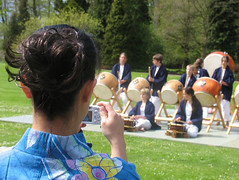
IMG_7565_crop_500
Originally uploaded by Peter Hesseldahl.
Just a striking scene. A Danish-Japanese festival at Egeskov slot, one of the arch-typical historical castles. So here’s a women in Kimono who’s travelled from Japan to watch Danish kids playing traditional Japanese music. I realize that this mix of culture probably wouldn’t even be noticed in so many other places. In Denmark this is still a budding future.
A new kind of roadkill
When will they start putting up signs on the roads in metropolitan areas warning against stray robots, hurtling themselves more or less mindlessly into the traffic?
Communism 2.0.
Our world is becoming transparent, on record, searchable. Typically what we we’re getting is greater freedom, but greater responsibility and accountability, too. At the moment we don’t really have to think too much about the responsibility part – not in a fundamental sense, like in terms of water, energy or food.
Rather often, though, when you look ahead, the prognosis looks like major crunch. Getting through a period of true crisis could change the technological balance dramatically. If things get tight, it would seem very easy to slip in the directions of a lot more control and disciplin. Not necessarily enforced from above as such, rather a general feeling that everyone should pitch in, that we can’t tolerate hogging ressources or behaving in a blatantly anti-social way. Central planning and common standards could be enforced like never before. Hitting the wall in terms of ressources we would face an installed instrument of pervasive control. It might even work – but I’d rather that we find ways to maintain some slack in time.
Back to the middleman
Friday, May 06, 2005
Danfoss Universe - open for business!
For my part, I've been coordinating the website - here, take a look.
Sunday, May 01, 2005
Climate change: now you see it
Tuesday, April 26, 2005
The ancient power of love
I am not babtized. I don't really feel a member, there's so much about the institution of the church that I have a hard time with. (E.g.the insistence on one, well defined God, the tendency to use God's forgiveness as an excuse for independent thinking and responsibility...)
Never the less, you cannot but marvel at the wisdom of the words of Paul in the first corinthian letter:
If I speak in the tongues of men and of angels, but have not love, I am only a resounding gong or a clanging cymbal. If I have the gift of prophecy and can fathom all mysteries and all knowledge, and if I have a faith that can move mountains, but have not love, I am nothing. If I give all I possess to the poor and surrender my body to the flames, but have not love, I gain nothing.
Love is patient, love is kind. It does not envy, it does not boast, it is not proud. It is not rude, it is not selfseeking, it is not easily angered, it keeps no record of wrongs. Love does not delight in evil but rejoices with the truth. It always protects, always trusts, always hopes, always perseveres.
Love never fails. But where there are prophecies, they will cease; where there are tongues, they will be stilled; where there is knowledge, it will pass away. For we know in part and we prophesy in part, but when perfection comes, the imperfect disappears. When I was a child, I talked like a child, I thought like a child, I reasoned like a child. When I became a man, I put childish ways behind me. Now we see but a poor reflection as in a mirror; then we shall see face to face. Now I know in part; then I shall know fully, even as I am fully known.
And now these three remain: faith, hope and love. But the greatest of these is love.
Wednesday, April 20, 2005
Steward Brand on environmental heresies
For me, the most controversial of those is nuclear power. I don't feel ready for nukes just yet.
I guess what it all comes down to is whether you believe that quantative growth is the only possible way forward. Should we charge ahead, fix the problems that may arise by applying ever more advanced technology - or should we back off a little, adopt an attitude of more with less, focusing on ressource effeciency. Of course the answer is to combine the two. Use the technology and science in a way that's in accord with the workings of the biosphere. Sounds easy. So: does nuclear power fit?
Saturday, April 16, 2005
Where To Find Great Free Photographs And Visuals For Your Own Online Articles
This is an amazing collection of links to places online for free photos. And in general, a quite impressive site with information on publishing.
The glacier simulator - still unfrozen

IMG_7397_800

IMG_7432_re_800
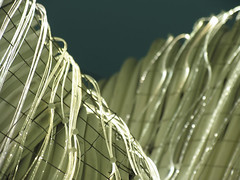
IMG_7460_800
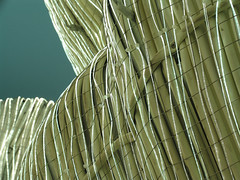
IMG_7436_800
Things are starting to take shape in the park. We're opening may 5th, so speed is building up by the hour. Very intense period, good fun too, luckily.
We're installing a simulator of a glacier crevasse. It's a giant freezer that you pass through on your way to a room with a vibrating floor and a video display about calving glaciers. The cooling tubes are interwoven with fiberoptic cable. The cooling has not been turned on yet, so I'm looking forward to see it covered with ice. Any day now.
Sunday, April 10, 2005
The price of gasoline
So let’s do the math, assuming that the exchange rate between dollars and Danish kroner is 5,8 and that 1 gallon equals 3.78 liters:
Translated into Danish kroners, the american gasolin price is 3.41 Danish Kroner for one liter of gasoline.
Translated into dollars, the Danish price of gasoline is $ 1.61 pr. Liter, or $ 6.09 pr. Gallon.
The myth of our perfection
We get ill, we forget, we have bad habits, dark sides of our personality. We have weak spots, we have screwed up relationships, ghost in our past.
My point is: We’re all weird in some ways, we live messy lives, we all have aspects of our life that are on, or beyond, the edge of what’s generally, officially acceptable.
But we also live in this collective myth of human perfection. As professionals, in public, and certainly in the media, we carefully remove all signs of imperfection and weakness. Enough of this, and you end up believing perfection is normal and mess is the exception.
Some of my friends once had their home featured in Arcitectural Digest. I could barely recognize the place: dressed up with furniture brought in for the occasion, rooms with absolutely no mess, except for a few pittoresque touches of humanness.
A reportage of maybe 15 photos, each representing a 1/125 second slice of reality. I happen to know that there haven’t been many 1/125 seconds since then in which the place has looked like what was presented in the magazine.
The facade blocks the view. Maybe we can make our life look orderly for long enough to make a good impression – but we know that the cupboards are bursting with hidden mess – the real stuff.
Saturday, April 09, 2005
If you need a hotel in Århus
This may sound a bit dramatic, but the place was a reminder of the importance of insisting on quality, beauty and kindness.
It's a three star hotel, not a high end place. The room I slept in was 995 kr, but they have cheaper rooms as well.
It had beautiful furniture, original art on the walls, it was absolutely clean, and there was free wifi access (such a positive gesture). Breakfeast was the best I've had in quite a while.
Anyway, it's hard to describe, but what made the difference was the sense that this was a very personal project - a project with the clear aim of making the stay nice for the guests.
(They have a new hotel in Copenhagen also. I'll have to try that out)
Now you know.
From a binary to a probabilistic paradigm
Indeed! As I see it, this is one of the main charateristics of the paradigm shift I’ve been trying to describe for years.
Clay Shirky used it to describe how our way of classifying information is changing as we move from physical to digital libraries. We no longer have to stick rigorously to official categories. Neither do have to make sure that each subject only belongs to one higher level category. In stead we can tag information in any number of ways, and let anyone participate in creating the tags. In fact the variance in how people classify a given document may only add to our understanding of it.
But moving from a binary to a probabilistic worldview applies much broader. It’s a general way of understanding reality that we have to learn.
We’ve been used to thinking that answers were certain, that truths were absolute, that conclusions were clear, that categories and facts were solid and objective.
But the new paradigm suggests that this is actually the exception. Most of the answers these days are not binary – a clear yes or no. Is it a good idea to invade Iraq, Is nuclear power bad, are we making progress? For the majority of questions you can only answer with a certain probability, and given certain contexts. One result of the spread of information is that we realize, that there are many truths and noone really knows very much for certain.
If I got really philosophical I would point out how this world view is represented even in basic physics – for instance, that you cannot know exactly where an electron is. You can only tell with a certain probability that it is at a particular location.
Saturday, April 02, 2005
Culture is a process
It’s obvious. Never the less there’s a very strong tendency to think that culture is motionless, something you should protect and never change. So keep away foreign influence, chant the old truths lest our precious national culture should become corrupted.
What’s on your i pod? You are.
Monday, March 28, 2005
Progress?
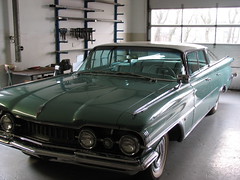
Steens oldsmobile
Originally uploaded by Peter Hesseldahl.
A Friend of ours just bought this mint condition Oldmobile 1959. It's an amazing artifact, getting inside feels like entering a time machine. The whole car oozes a completely different logic, a way different world view. It's BIG, it's got tail fins, massive use of chrome, everything is vast and heavy, including the enormous engine. The whole thing weighs in at 2400 kg.
Well, guess what: This happens to be exactly what the Porsche Cayenne SUV or the exceedingly popular VW Touareg weighs. But this is 2005 and our climate has gone haywire in the meantime! It's even worse here in Denmark, where the dealers have found a way of adding a few hundred extra kilos in order to make the Porsche get sufficiently heavy to be taxed like a truck (which happens to have a top speed of 266 km/h).
Sorry to spoil the party, but to me this is one of those totally perverted examples of absolute mindless consumption. A way of sending a very exact signal to everyone else on the road: I don't give a damn.
Friday, March 18, 2005
Folkeskolens formålsparagraf
Jeg snublede lige over Folkeskolens formålsparagraf. Ganske interessant læsnig i al sin poetisk - juridiske knaphed.
Jeg synes den er flot:
Undervisningsministeriets lovbekendtgørelse nr. 55 af 17. januar 1995
Folkeskolens formål
§ 1. Folkeskolens opgave er i samarbejde med forældrene at fremme elevernes tilegnelse af kundskaber, færdigheder, arbejdsmetoder og udtryksformer, der medvirker til den enkelte elevs alsidige personlige udvikling.
Stk. 2. Folkeskolen må søge at skabe sådanne rammer for oplevelse, virkelyst og fordybelse, at eleverne udvikler erkendelse, fantasi og lyst til at lære, således at de opnår tillid til egne muligheder og baggrund for at tage stilling og handle.
Stk. 3. Folkeskolen skal gøre eleverne fortrolige med dansk kultur og bidrage til deres forståelse for andre kulturer og for menneskets samspil med naturen. Skolen forbereder eleverne til medbestemmelse, medansvar, rettigheder og pligter i et samfund med frihed og folkestyre. Skolens undervisning og hele dagligliv må derfor bygge på åndsfrihed, ligeværd og demokrati.
Danish government searching for the experience economy
Sorry, it's all in Danish. You ought to learn that language.
Friday, March 11, 2005
What's wrong with this picture?

DSB tea
Originally uploaded by Peter Hesseldahl.
Well, it looks perfectly normal, it IS perfectly normal - and that's what's wrong.
I'm on a train, I ask for a cup of tea. So I get:
1 paper cup
1 tea bag
approx. 150 ml. Hot water
1 wooden stick to stirr
2 plastic container, sealed with aluminium foil, each containing 10 ml. Of low fat milk
1 plastic cup - to place the used tea bag in.
1 napkin
I hate it. I feel sad about it. Wasting the world for silly little things. Often I will simply not ask for anything, but as often I forget - and again I sit there with this pile of highly refined garbage. Certainly, I've tried FAR more consuming solutions to the problem of getting me a cup of tea or a bite to eat. It's out of proportions, but we've become blind to it.
Wednesday, March 09, 2005
TV debate on EU software patent directive
Nothing original there, but it's hardly mainstream politics.
If you're Danish you might want to have a look.
Friday, February 25, 2005
De tavse tsunamier - radio
Indslaget varer omkring 17 minutter og starter ved 21.30.
Lyt til indslaget fra Danmarks Radio
Du kan også læse manuskriptet her i stedet.
Thursday, February 24, 2005
Busking, with the blessing of authority
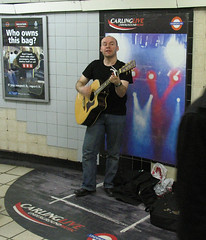
busking_6684_600
Originally uploaded by Peter Hesseldahl.
In the London tube there are now "busking pitches", little areas designated to street musicians.
I've enjoyed endless hours playing with my old band on the streets of Europe - including the London underground. I always hated the part about feeling illegal, always prepared to run lest the police slap a fine on you.
A closer look at the fine print reveals that there's a consideable bureaucracy involved in this case. You can book the spot for two hours at a time, but before you can book, you have to send an application and show up at an audition. Part of the approval procedure involves turning over quite a bit of personal information, including any previous criminal records.
Not very useful for someone just passing through town - but still, overall it looks like progress to me. At least it's officialy acknowledged now.
Oh yeah, and of course the whole setup is sponsored by a local brewery.
Flower power

orchid_7128_800
Originally uploaded by Peter Hesseldahl.
Just spent the better part of two days at the annual "orchid festival" in London's Kew gardens photographing flowers together with my 13 year old daughter. What a great experience! The flowers are amazing, the whole botanical garden is an impressive testimony to the splendour of the British empire and victorian wealth.
And the best part of it is sharing the experience and a concentrated creative effort with Katrine.
Returning with about 500 shots, we should have plenty of stuff to rehearse our photoshop skills on.
Friday, February 18, 2005
A page full of links to science centers
... And by the way, let me know if you do.
Monday, February 14, 2005
Hold jer langt fra Team Benn's rejser
Hvad skal man gøre? Vi er 25 voksne og børn, der har købt en skiferie i Norge her om en uge. Tilfældigvis ringer en af os til rejsebureauet - Team Benn - og får tilfældigvis at vide, at de ikke kører med sovebusser i Norge. Det ændrer unægteligt udsigterne en del i betragtning af at vi bliver læsset direkte ud at stå på ski, når vi ankommer.
Men vi har betalt rejsen, og de holder på pengene, selvom guderne skal vide, at vi aldrig var hoppet på den, hvis vi vidst at vi ville komme til at sidde ret og op og ned to nætter i vores ferie.
Team Benn tilbyder at kompensere ved at tilbagebetale de 100 kr. pr. person som vi havde betalt ekstra for sovevogn. Rørende...
De har vidst det i månedsvis, men har indkradset betalingen uden at give varsel. Vi kunne have arrangeret alt muligt andet, hvis bare de havde sagt noget.
Puh, det stinker!
Så hold jer fra Team Benns.
(Ah, sådan, nu har jeg det meget bedre)
Sunday, February 13, 2005
Nostalgia
Bonnie Raitt singing "Angel from Montgomery" on "Road tested":
"The years they just flow by like a broken-down dam"
New job!
I've changed jobs. I now work for Danfoss Universe in Nordborg, Denmark.
Danfoss is one of the largest Danish companies, they make thermostats, valves, pumps - all kinds of components for houses and macinery.
The foundation behind the company is starting up an experience park with the purpose of presenting the basic concepts of natural science. Like an exploratorium, the idea is to introduce children to the fascination of science and technology in a hands-on way. The park will open may 5th, starting out with 135 different exhibits (including a 20 meter high blue cube with an 18 meter artificial geyser, an artificial glacier and a simulation of a volcano inside). There will also be an educational center based on Howard Gardners 7 intelligences. Over time, the intention is to make Danfoss Universe a center for developing better ways of teaching natural sciences.
It's a subject that is dear to my heart, but what's most exciting to me is what we potentially will be able to build on this platform. There's any number of important stories to tell.
You can see a little at our rudimentary website below. It WILL become a lot better, very soon.
Danfoss museum and teknorama
Tuesday, February 08, 2005
Massive Change: The Future of Global Design
Excellent project. Bruce Mau studio has created an exhibition at the Vancouver Art Gallery describing the massive change we're heading for in coming years. The emphasis is very much on what you can do yourself to act and become a player in shaping this future.
Of course it's beautifully designed, stunning pictures.
And the radio interviews are a special treat.
You can listen to hour-long interviews with folks like Dean Kamen, Steward brand, Janine Benyus, Fridtjof Capra, Bob Langer... it goes on and on.
Friday, February 04, 2005
Designer surveillance
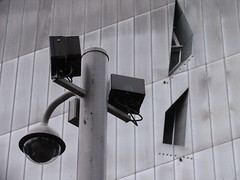
jewish museum surveillance
Originally uploaded by Peter Hesseldahl.
Who said Big Brother couldn't be Stylish?
Daniel Liebeskind's Jewish museum in Berlin.
Mein freund Ampelmann
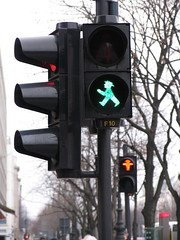
ampelmann
Originally uploaded by Peter Hesseldahl.
Unter den Linden, Berlin. A few things remain of the old east - the Ampelmann, for instance. Nice touch, particularly around Friedrichstrasse, probably the most blatantly capitalist new part of town.
Cyber chauffeur
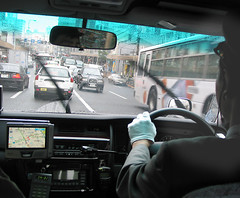
cyber_chauffeur
Originally uploaded by Peter Hesseldahl.
Speaking of futuristic taxis:
Here's a snapshot from a cab in Tokyo.
Old world: white gloved chauffeur, in cap and uniform. Immaculately clean interior, including white lace seat covers.
New world: Headset dangling from his ear, satellite navigation, various unidentified hi-tech.
Driving through Tokyo, the metropolis itself a mix of ancient traditions and Beyond Bladerunner.
Meter mirror
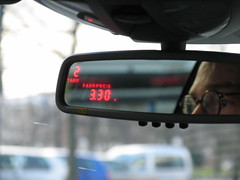
taxameter mirror
Originally uploaded by Peter Hesseldahl.
I saw this neat futuristic feature in a Berlin cab. The price of the meter is displayed in the rearview merror.
Toll!
Thursday, January 27, 2005
Clinton, Gates, Bono, Blair, Mbeki, Obasanjo - on stage together
you oughta hear this. 27 minutes, 15 of them rock. A weird mix of very clever people who care, sharing the stage talking about how to avoid incomprehensible suffering. At Davos, where the people who are supposed to rule earth have gathered.
Rock star Bono and Clinton are both amazing communicators.
Here's Bono telling about talking to Tom Lantos, an originally hungarian politician and democratic member of congres, who was put on the trains to a hungarian concentration camp. He told Bono of his experiences, of what it was like to deal with the holocaust as a child.:
"He told me that the thing that haunts him later on in his life more than anything was, as a child, the looks of the faces of the people who stood by and watched them be loaded on the trains – the passersby, just the people who stopped . They saw these families being put on trains and they didn’t ask where they where going.
Well, I asked him – and it was a very hard thing to do to someone who has had that experience – is there anything analogues to this [the global development and poverty issues] here?
And he said yes, there is, but here we know where the trains are going. We know that these people are going to die from lack of drugs that you can get in any corner shop, we know that people are going to die because of a mosquito bite when they shouldn’t.
And Bono replied to him that whenever he spoke about this, he would say that we, this time, are going to lie in front of the trains".
Nigeria's president Obasanjo points out very clearly how our security - the rich man's security - is directly dependent upon the poor man's security:
"You cannot really talk about security without talking in military terms or in the absence of violence and conflict terms without talking about security in terms of food, in terms of employment, in terms of education, in terms of health".
And here’s Bill Clinton, speaking about the lack of funding for combating disease:
"This is cheap. Let’s get real: The president just asked for 80 billion dollars for the Irak war – for a year. For a pittance of that we could double Americas international assistance. It’s cheap!".
And while we're at it. There's a one hour conversation with Bill Clinton, you cannot turn away:
World Economic Forum - Webcasts
World Economic Forum - Webcasts
Nice. I would love to go to Davos, but like Chirac, my helicopter couldn't make it. Luckily, I can simply watch the videos of all the speeches. It's cheaper, too.
Tuesday, January 25, 2005
Nice and cold

snemand_700
Originally uploaded by Peter Hesseldahl.
Snow at last. I used to dread the cold, but these days some frost and snow is reassuring, there's still some elements of winter left.
In Denmark this january was the warmest recorded. Brrrr... chilling.
Sunday, January 23, 2005
Toward a Literacy of Cooperation
Not for everyone perhaps, but if new forms of cooperation, social software, smartmobs, prisoners' dilemma or the tragedy of the commons sounds like important topics, well, check out this course at Stanford.
Howard Rheingold of "smartmobs" fame and Andrea Saveri from the Instititute of the future have put together a string of great speakers - streamed to you in glorious video weekly.
Knark Mopfler
I've spent many hours playing along with my Dire Straits and Knopfler records. Knopfler's solo albums are a mixed lot. Seems that about half of the songs are really great, while the other half are forgettable. His latest album, Shangrila, is the best since "golden heart". My favorites are the odd numbers: 3,5,7,9,11 - and not least 13: Donegan's gone.
Yeah, Lonnie Donegan, glad to hear to someone knows about skiffle. (Skiffle...?)
The defining moments of globalization
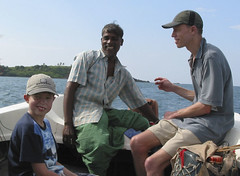
dayasena2
Originally uploaded by Peter Hesseldahl.
Globalization has its defining moments where we realize that we have been connected and experience and participate in global events in ever more direct or immediate ways: The pictures of earth from space, Live aid, the bombing of Bagdad in the first Gulf war, and 9/11, of course,
Our family spent six weeks in Sri Lanka last year, a good part of them along the wonderful southern coasts that have now been devastated by the tsunami. Naturally, this disaster seems much closer and understandable to the many people who have been to the affected areas.
It gets personal. We met this guy, Dayasena, a fisherman, while my son and I were having a haircut in a local barbershop. We had some great discussions and a wonderful day out on his boat. We knew he lived very close to the ocean so we have been worrying a lot about him and his family. We wrote him but didn't really believe that a letter could be delivered, considering the mess, we've seen on pictures. But, we just got a letter back from him - amazing. His boat has been wrecked, but his house happens to be on a small hill so it was safe.
Now we have to figure out how to get some money down to him.
Thursday, January 20, 2005
Ze Metro
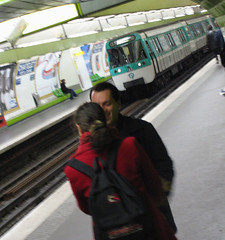
metro
Originally uploaded by Peter Hesseldahl.
Ah, Paris. The particular smell of the Metro. Stirs up long forgotten episodes from weird youthful trips. Romantic, ultra low budget, I could even speak French then (well, more so than now, at least)
If you want to help - get out of the way
Things are progressing. The World Bank estimates that the number of people living in extreme poverty dropped from 1.5 billion to 1.1 billion between 1981 and 2002. But obviously, this was mainly due to China, India and other Asian countries bootstrapping their economies – not because of well meaning advice from the development community.
Over lunch, in splendid French diplomatic settings, Inge Kaul, director of UNDP office of development studies, was kind enough to explain her philosophy to me – and it seems that her line of thinking is indicative of where development efforts may be heading.
"Get out of the way. Don’t go and tell the developing countries what they should do". In stead of investing in imposing our solutions on them, we should remove the obstacles and shackles that make it so hard to move forward.
The enormous agricultural subsidies for EU and US farmers severely distort world market prices and makes it hard for local farmers to compete even in their own region.
The debt burden from past ill advised and corrupted development programs means that a country like Zambia spends 5 times more on paying back loans than on health – in the middle of a ravaging AIDS epidemic.
In short: At the moment we’re insisting that a significant part of the taxes collected in the developing countries are used to pay back loans to the rich countries, we are subjecting their industries to unfair competition in the very market we tell preach that they should enter – and when we generously donate, it’s usually in the form of programs that do what we feel should be done.
Hmmm…
Yeah, shocking
UNDP annual forum, hosted by the French foreign ministry. Mark Mallotch Brown, coordinator of the UNDP (and just named chief of staff for Kofi Annan) talks about the "silent Tsunamis".
Yes, the Tsunami in the Indian Ocean claimed 150.000 lives so far, but:
Every day 6000 people are killed by HIV/AIDS – and another 8.200 are infected.
Every 30 seconds an African child dies of malaria – it adds up to more than a million child deaths a year
Every hour more than a thousand children under five die from diseases linked to poverty – the equivalent death toll of two tsunamis pr. Month.
...Yeah, yeah, you’ve heard it. We all know. It just churns somewhere in the background. Doesn’t make it in the news, somehow. Too dispersed, too ordinary.
For me, and appearantly to many others, the tsunami was a very clear demonstration of how humanity has become closer connected. Many of us outside the disaster area have been there as tourists, we know people there, we have the "before" pictures in our photo albums.
But clearly the One World feeling doesn’t extend everywhere. For one, sub Saharan Africa is clearly not in yet.
Saturday, January 08, 2005
Thorvaldsens Venus (plus photoshop)

venus hoved_7
Originally uploaded by Peer Hesseldahl.
Raced through Thorvaldsens Museum in Copenhagen the other day for some raw material to play around with. This is what I came up with - a pale imitation of Warhol, I know, but in fact inspired by my old friende Michael Holmstrøm.
Stormy weather
DR Nyheder Online - Vejret - Orkan rammer Jylland
TRUST UNCERTAINTY! – A MINDSET FOR CHANGE
nynatur




